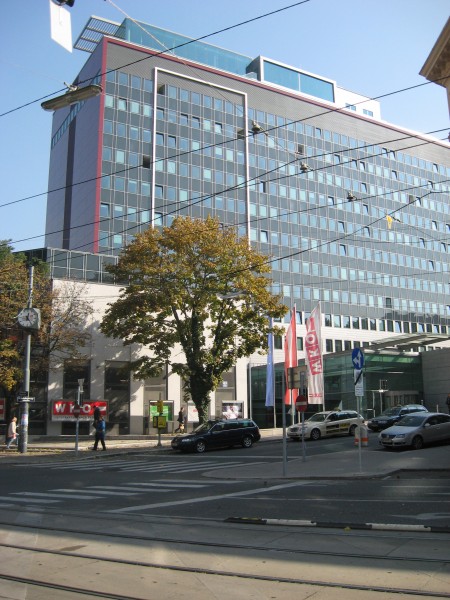Austrian Economic Chamber: Opportunities and Challenges for Austria in Global Trade Dynamics
Against the backdrop of an increasingly interconnected global economy and the challenges posed by geopolitical tensions, Mariana Kühnel, Deputy Secretary General of the Austrian Federal Economic Chamber (WKÖ), emphasized the critical role of international trade for the Austrian economy. On the occasion of the Market Access Day in Vienna, she spoke about the need to secure access to global markets and open the doors to international sales markets, especially for small and medium-sized enterprises (SMEs).
 Austria requires international trade, particularly for SMEs, to diversify sales markets and secure raw material supply, as highlighted by Mariana Kühnel's speech at WKÖ's Market Access Day. / Picture: © Wikimedia Commons / Robert Schediwy [CC BY-SA 3.0]
Austria requires international trade, particularly for SMEs, to diversify sales markets and secure raw material supply, as highlighted by Mariana Kühnel's speech at WKÖ's Market Access Day. / Picture: © Wikimedia Commons / Robert Schediwy [CC BY-SA 3.0]
"Austria's prosperity and jobs are largely dependent on our export companies. To continue this success story, we must create competitive and innovative framework conditions and give our companies access to global growth markets," explained Kühnel. She emphasized that a diversified and stable supply of raw materials and access to a wide range of markets are essential for Austrian companies, especially in uncertain times.
The Deputy Secretary-General referred to the European Union's extensive trade agreements with over 70 countries worldwide, which make a significant contribution to facilitating trade relations and strengthening the European economy. Kühnel emphasized that these agreements not only promote economic cooperation but also provide a platform for political and cultural exchange.
The upcoming EXPO 2025 in Osaka is seen by the WKÖ as a strategic opportunity to further intensify economic relations with Japan. A "Road to Expo" campaign has been launched to highlight Japan's diverse potential for the Austrian economy and to strengthen bilateral trade relations. In these geopolitically challenging times, a proactive European trade policy is essential for exporting nations such as Austria to maintain competitiveness and open up new markets.
Kühnel was particularly encouraged by the example of the trade agreement between the EU and Japan, which has already led to considerable savings in customs duties for Austrian companies. "These savings are a concrete example of how well-designed free trade agreements can contribute directly to increasing our competitiveness," said Kühnel. The focus is not only on existing agreements but also on efforts to bring negotiations with important trading partners such as Australia, India, and Indonesia to a swift conclusion. The resumption of talks with the Philippines and Malaysia underlines the ambitions of Austria and the EU to further expand and adapt the trade network. These efforts are not only economically motivated but also driven by the need to lay the foundations for the green transition, for example by securing the supply of essential resources and input materials for renewable energy technologies.
The economic expert also addressed the challenges associated with increasing globalization and changing international relations. She emphasized the need to continuously adapt trade policy to these developments to ensure that Austrian companies remain competitive and can successfully tap into new markets.
"Our efforts to drive forward the conclusion of trade agreements with strategic partners such as Australia, India, and Indonesia are crucial. These agreements are not only of economic importance but are also key to securing the supply of raw materials and supporting the green transition," explained Kühnel.
In conclusion, Kühnel emphasized the importance of an active and forward-looking trade policy for strengthening the Austrian and European economies. Mariana Kühnel's speech at the Market Access Day was a clear signal of the need to use international trade as an engine for growth and innovation while at the same time upholding the principles of sustainability and fair trade.
However, EU and Austrian trade policy is not only about facilitating access to markets and removing barriers to trade. It is also about promoting fair and sustainable trade relations that take social and ecological standards into account. In this context, the European Commission conducts independent sustainability impact assessments to analyze the potential impact of trade agreements and ensure that these agreements meet the interests of all parties involved.
In a rapidly changing global landscape in which trade relations are coming under increasing pressure, Austria is sending a strong signal about the importance of openness, cooperation, and multilateral approaches. By promoting free trade and strengthening international partnerships, Austria is making a significant contribution to global economic growth and the development of sustainable trade networks.



